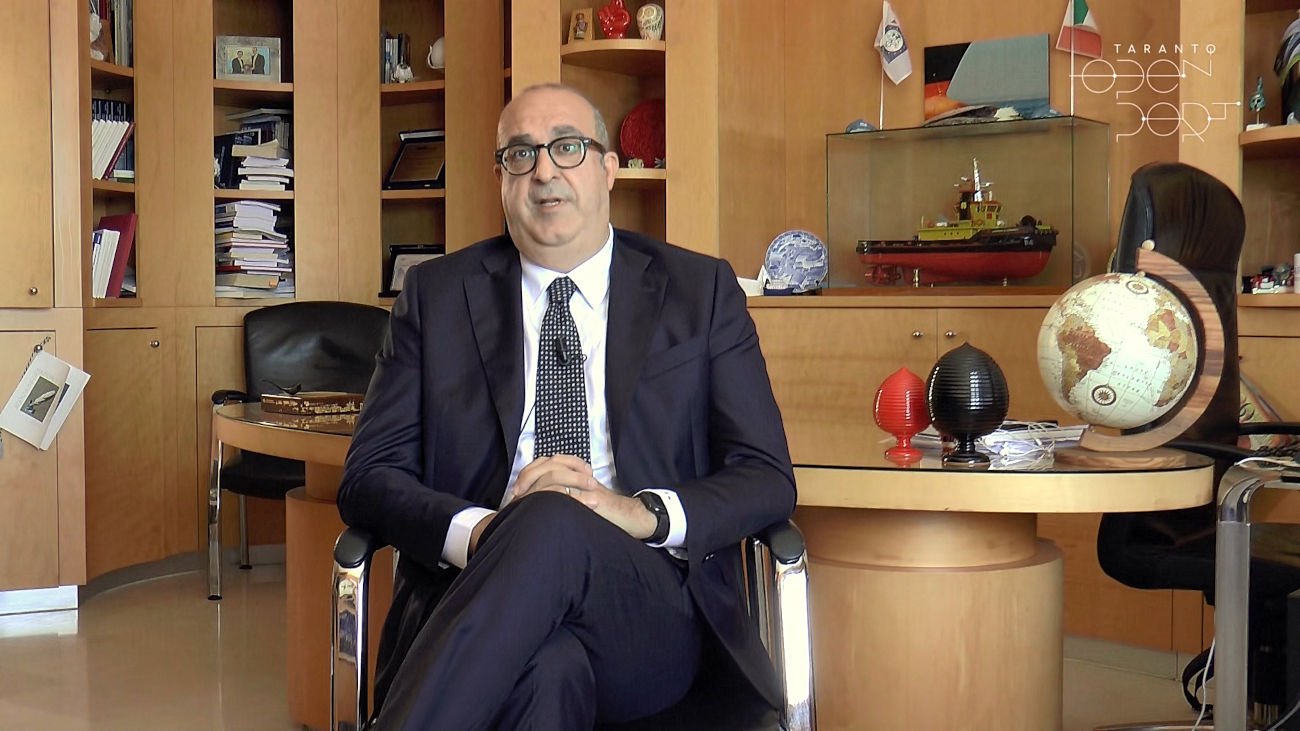Sergio Prete Interview
THE PORT OF TARANTO: FROM CRISIS TO REBIRTH
THE PORT OF TARANTO: FROM CRISIS TO REBIRTH
When I first arrived, in June 2011, I immediately had to deal with a series of critical issues that were on the horizon.
In particular, we started with the crisis at the container terminal, and then this situation was compounded by other particularly important ones, such as the sequestration of the Ilva plant in July 2012, which had a devastating impact on the port, especially in relation to traffic, which clearly collapsed with the decrease in production and cargo handling at the wharves.
But then Cementir’s ceasing production was another important factor that caused a reduction in traffic, so it was a critically important situation, but one that was addressed with a new programme by the authority, which firstly had to restart an upgrading of the infrastructure.
Upgrading infrastructure as a reaction to the crisis.
Once implemented, however, this first part of the infrastructuring, which is still in progress, the results, though, fortunately have been seen because recently, at last, we found a major new operator to manage the container terminal, the company Ylport, which is part of a Turkish holding company and is currently the twelfth largest operator in the world.
We have also recently added the port of Taranto to the itineraries of the cruise ships of the MSC company including its flagship as well as the granting of the concession for the management of passenger reception services to the world’s leading independent operator, Global Ports Holding.
Other initiatives have also been launched with the aim of diversifying traffic in the port to reduce the impact of industrial traffic in the general context of the port by increasing, in particular, the commercial, logistics and tourism sectors.
The port during the 20th century
Until the end of the nineteenth century, Taranto did not have a commercial port, there were small structures within the Mar Piccolo.
At the beginning of the 20th century, it was decided to build a first wharf, a first quay right where we are now, on the Saint Catald quay.
The construction of this infrastructure certainly increased traffic, but it still remained insignificant.
Suddenly, in the 1970s, the port of Taranto jumped to third place in Italy for the movement of goods, thanks to the construction of the steelworks, which resulted not only in a major expansion of the infrastructure, because wharves and quays were built specifically to serve the steelworks, but the traffic generated by the Ilva plant was then joined by that of the Eni refinery and Cementir.
So we can say that until 2001, the port of Taranto was exclusively an industrial port.
The 2000s: towards traffic diversification
From 2001 to 2014, we also had a period linked to the launch of the transhipment hub managed by the Taiwanese company Evergreen, which, although it was an important period, it never produced more than 15% of the total traffic generated by the port of Taranto, which continued to be a predominantly industrial port.
It was clear that the crisis in the sector and the sequestration in 2012 highlighted this anomaly in the port of Taranto, and this is why we focused on a diversification drive, to ensure that the port of Taranto transformed from an industrial port to a multifunctional port.
The need for a cultural change.
It was clear that these strong measures, that we undertook in conjunction with the municipal administration to diversify port activities had to be based above all on a cultural and informational change, and a first step was the removal of the east gate and the return of part of the St Catald quay to public use, but then there was a major urban redevelopment project for the hinge areas between the port and the city, so that they could also be redeveloped and used for cultural and entertainment purposes and to make this part of the city more attractive, which today has been somewhat forgotten not only by tourists but also by the citizens of Taranto themselves.
The perfect intermodality
The strategic importance of the port of Taranto was highlighted, which in the past had also probably been somewhat neglected due to its industrial nature, but the strategic importance of the port of Taranto rests also, and above all, on trade routes.
In that it is one of the first ports one encounters after travelling through the Suez Canal and the Asia-Europe route is the fastest growing one in recent years compared with the other main international maritime routes.
And also the possibility of offering intermodality through the presence of rail links, which are currently being upgraded, and the existence of connecting roads, as well as the presence of an airport such as Grottaglie, just 20 kilometres away, represents an exception on the international scene, as it can count on so-called perfect intermodality, i.e. water, rail, road and air.
The port 6.0
In our recent planning we have also decided to follow an innovative theory that talks of “ports 6.0”, i.e. modern ports that in addition to developing traditional functions follow new activities and new functions, and I’m referring in particular to environmental sustainability and green ports.
The other aspect is that of innovation.
For some time now we have been working on a project linked to the creation in the port of Taranto of an accelerator for start-ups in the port sector that would, in some way, make Taranto an excellent location and could also give an added value to the future of the port of Taranto, but Taranto will also be the site of the first offshore wind farm and a national company will indeed start building this wind farm in the summer which will produce its own electricity from some turbines installed in the area of the port of Taranto and this is the first initiative that, in some way, comes just from Taranto.
*** Automatically generated subtitles ***


